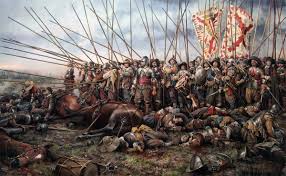battle
英 [ˈbæt.əl]
美 [ˈbæt̬.əl]
- n. 战役;斗争
- vi. 斗争;作战
- vt. 与…作战
- n. (Battle)人名;(英)巴特尔;(法)巴特勒;(西)巴特莱
使用频率:

记忆方法
将“battle”与“ball”联想起来,想象一场“战斗”就像是一场在球场上进行的大型对抗赛,这样可以通过视觉联想帮助记忆“battle”表示战斗、斗争的意思。
以上内容由AI生成, 仅供参考和借鉴
中文词源
battle 战斗
词源同beat, 击,打。-le, 表反复。
英语词源
- battle
-
battle: [13] English acquired battle via Old French bataille and Vulgar Latin *battālia from late Latin battuālia ‘fencing exercises’. This was a derivative of the verb battuere ‘beat’ (source also of English batter and battery), which some have viewed as of Celtic origin, citing Gaulish andabata ‘gladiator’, a possible relative of English bat.
Related words include battalion [16], ultimately from Italian battaglione, a derivative of battaglia ‘battle’; battlements [14], from Old French batailler ‘provide with batailles – fortifications or battlements’; and derivatives such as abate, combat, and debate.
=> abate, bat, battalion, battery, combat, debate - battle (n.)
- c. 1300, from Old French bataille "battle, single combat," also "inner turmoil, harsh circumstances; army, body of soldiers," from Late Latin battualia "exercise of soldiers and gladiators in fighting and fencing," from Latin battuere "to beat, to strike" (see batter (v.)). Phrase battle royal "fight involving several combatants" is from 1670s.
- battle (v.)
- early 14c., "to fight," from French batailler (12c.), from bataille (see battle (n.)). Related: Battled; battling.
权威例句
- 1. He won a head-to-head battle with NF leader Jean-Marie Le Pen.
- 他在和国民阵线领袖让-马里·勒庞的正面交锋中获得了胜利。
- 2. It's an uphill battle but I think we're going to win.
- 虽然这是一场艰苦的斗争,但我相信我们会取得胜利。
- 3. This courtroom battle has been a poor advert for English justice.
- 这场法庭上的争论为英格兰的司法制度做了一次拙劣的广告。
- 4. He stared into the dark void where the battle had been fought.
- 他凝望着那片漆黑的空旷之地,那次战役就是在这里进行的。
- 5. In a naval battle your aim is to sink the enemy's ship.
- 在海战中目标就是击沉敌船。